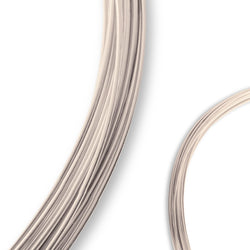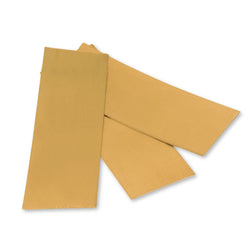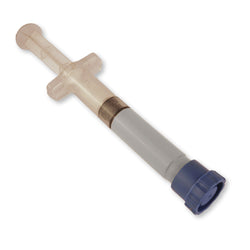Jewellery Solder
Elevate your jewellery creations with our professional-grade jewellery making solder, tailored to bring durability and brilliance to your designs.
Choose from our versatile range, available in wire, sheet, and paste forms, to ensure strong bonds and a flawless finish.
Professional Grade Jewellery Solder
Soldering is a fundamental technique in jewellery making, essential for creating strong, durable connections between metal components. Whether you're working on delicate chains, intricate rings, or sturdy bracelets, the quality of the solder you use directly impacts the final product's strength and finish. At Ore Metals, we offer a comprehensive range of solder products specifically designed for jewellery making. Our collection includes solders in various forms—wire, sheet, and paste—and in different alloys such as gold, silver, and platinum, ensuring that you have the right materials for every project.
Solder for Every Jewellery Project
Our solder collection caters to the diverse needs of jewellers, offering different types of solder suited for various applications. We provide easy, medium, and hard solder options, each with different melting points, allowing you to select the appropriate solder based on the specific requirements of your project. For instance, easy solder, with its lower melting point, is ideal for tasks requiring minimal heat, while hard solder, with a higher melting point, is perfect for creating robust joints in high-stress areas. Additionally, our solder products are available in precious metal alloys such as sterling silver, 9k, 10k, 14k, 18k, 22k gold, and platinum, ensuring compatibility with the metals you are working with.
Applications of Solder in Jewellery Making
Solder is indispensable in various stages of jewellery making. It is commonly used to join components such as jump rings, chain links, bezels, and clasps, providing a secure and invisible bond that enhances the durability and aesthetic of the piece. In ring-making, solder is essential for attaching the shank to the setting, ensuring that the connection is strong enough to withstand daily wear. Solder is also crucial in constructing multi-component pieces, such as pendants and earrings, where it ensures that all elements are securely attached without compromising the design's integrity. Whether you are crafting intricate filigree work or simple band rings, the right solder will help you achieve a professional finish.
Benefits of Using High-Quality Solder
Using high-quality solder in your jewellery projects offers numerous advantages that enhance both the crafting process and the final product. High-quality solder melts smoothly and flows evenly, allowing for precise control during the soldering process. This predictability is crucial in avoiding issues such as pits, gaps, or weak joints, which can compromise the piece's durability. Additionally, our solder products are engineered to blend seamlessly with the surrounding metal, ensuring that the soldered joints are virtually invisible and do not detract from the overall appearance of the jewellery. Moreover, high-quality solder is more resistant to tarnish and corrosion, which is essential for maintaining the longevity and brilliance of your jewellery pieces.
Tips for Effective Soldering in Jewellery Making
Mastering the art of soldering requires practice and attention to detail. Start by ensuring that your workspace is clean and well-ventilated, as this will help you achieve the best results. Pre-clean all metal surfaces to remove any oils or oxidation, which can prevent the solder from adhering properly. When applying heat, use a torch with a fine, adjustable flame to control the temperature precisely and avoid overheating the metal. Additionally, always use the appropriate flux to protect the metal from oxidation during heating and to ensure that the solder flows smoothly into the joint. Practice on scrap pieces before working on your final design to build confidence and refine your technique.
Enhancing Your Jewelry Designs with Specialty Solders
At Ore Metals, we offer specialty solders that can add the finer details to your jewellery designs, allowing for seamless repairs and modifications. We also provide low-temperature solders for use with delicate components that are sensitive to heat, such as gemstones or intricate filigree work. These specialty solders expand your creative possibilities, enabling you to tackle more complex projects with precision and ease.
Frequently Asked Questions
Solder is a metal alloy used in jewellery making to join two or more metal pieces together. It melts at a lower temperature than the metals being joined, creating a strong bond when it cools and solidifies.
Soldering is essential for various tasks like attaching jump rings, creating bezels, and repairing broken jewellery.
There are several types of solder used in jewellery making, including silver solder, gold solder, and platinum solder. These come in different forms such as hard, medium, and easy, each melting at different temperatures to accommodate various stages of the soldering process.
The difference between hard, medium, and easy solder lies in their melting points. Hard solder melts at the highest temperature, making it ideal for the initial stages of assembly. Medium solder has a mid-range melting point, while easy solder melts at the lowest temperature, perfect for final joins without disturbing previous solder work.
Solder melting temperatures vary depending on the type and hardness. For example, silver solder melts between 620°C to 770°C (1148°F to 1418°F), while gold solder melts between 710°C to 950°C (1310°F to 1742°F). It’s crucial to match the solder’s melting point to your project’s needs.
For beginners, easy solder is often the best choice due to its lower melting point, making it easier to work with. Silver solder in easy grade is commonly recommended for its versatility and ease of use, allowing beginners to practice without damaging their pieces.
Choosing the right solder depends on the metals you are working with, the type of join you need, and the stage of your project. Use hard solder for initial joins and easy solder for final joins. Match the solder’s metal type (silver, gold, etc.) to your base metal for compatibility and a seamless finish.
Soldering jewellery at home requires a careful setup and the right tools. Begin with a clean, fireproof work surface, and gather your soldering essentials: a torch, solder, flux, pickling solution, and safety equipment. After positioning your pieces to be soldered, apply flux to prevent oxidation and allow for smooth solder flow. Cut a small piece of solder and place it near the join, heat both pieces evenly until the solder flows, and amalgamates the two pieces. Then quench and pickle your piece to clean off any residue.
Deciding whether to use wire, sheet, or paste solder in your jewellery making process depends on the specific requirements of your project and your proficiency with soldering techniques.
Wire solder is often preferred for its ease of handling and precision; it’s excellent for reaching into tight spaces and creating delicate joins. For intricate work, such as when attaching findings or doing detailed metalwork, wire solder can be the best choice. Australian jewellers frequently opt for wire solder for its versatility and control.
Sheet solder provides an advantage when larger areas require even coverage or when you need to cut exact amounts for consistent joins. Sheet solder can be cut to size, offering jewellers the ability to use the exact amount needed, which minimizes waste. This form is particularly suitable for tasks that require multiple pieces to be joined at once.
Paste solder, on the other hand, comes pre-fluxed and is a convenient option for beginners or for those working on complex pieces where placing wire or sheet solder is difficult. The paste can be applied directly to the join and is easy to use in production work, ensuring a consistent application with minimal clean-up.
Each type has its own set of benefits, and the best choice often comes down to personal preference and the specifics of the jewellery pieces you are creating. Our Jewellery making supplies offer a range of solder options to suit different skill levels and project needs, ensuring that you can find the perfect match for your work.
Always consider the melting temperature and the flow characteristics of the solder you choose, to ensure it complements your jewellery's metal and design intricacies effectively.
Flux is a chemical compound applied to metal surfaces before soldering to prevent oxidation and ensure the solder flows smoothly. It helps create clean, strong bonds by keeping the metal surfaces clean and free from contaminants during the soldering process.
Safety precautions for soldering jewellery include working in a well-ventilated area, wearing protective eyewear and gloves, and using a heat-resistant surface. It’s also important to keep flammable materials away from your workspace and to use a fume extractor if possible.
Essential equipment for soldering jewellery includes a soldering torch, soldering block, flux, solder (wire, sheet, or paste), tweezers, a pickling solution for cleaning, and protective gear such as safety glasses and gloves.
When selecting solder for jewellery, the choice is typically based on the type of metal you're working with. For gold jewellery, you would use a gold solder, while for silver pieces, a silver solder is most appropriate.
It's also important to consider the melting temperature and the flow properties (easy, medium, or hard) to ensure it complements the fabrication process of your jewellery item.
Soldering jewellery is safe when proper safety protocols are followed. It involves working with high heat and potentially hazardous materials, so appropriate ventilation, heat-resistant surfaces, safety glasses, and gloves are essential.
Being educated on the soldering process and understanding the materials you're working with is also crucial.
After soldering, clean up your jewellery piece by quenching it a pickling solution to remove any oxidation and flux residue. Rinse thoroughly and polish the piece to restore its shine.
Solder wire, sheet, and paste differ in form and application. Solder wire is versatile and easy to control, solder sheet is great for precise cutting into custom shapes, and solder paste is ideal for small, detailed work where control is essential.
The best solder for silver jewellery is silver solder, available in hard, medium, and easy grades. Easy silver solder is commonly used for its lower melting point, making it ideal for most silver jewellery projects.
For gold jewellery, gold solder is the best option. It is available in different karats to match the purity of the gold you’re working with. Use 14k or 18k gold solder, depending on the gold content of your jewellery piece.
Technically Yes, silver solder can be used on gold, however it is unadvised as the bond will not be strong and it will leave a visible seam. It’s best to use gold solder for a seamless finish that matches the colour and purity of the gold.
The best solder for platinum jewellery is platinum solder, which has a high melting point to match platinum’s durability. It ensures a strong bond and a consistent finish with the platinum metal.
Gold solder is made of a combination of gold, silver, copper, and sometimes zinc, depending on the karat and colour. The alloy is designed to match the colour and melting point of the gold being worked with.
For repairing broken jewellery, use a solder that matches the metal of the piece. Medium silver or gold solder wire is ideal for repairs because of its balance of low melting point and strength, which minimises the risk of damaging the surrounding metal, and provides long term durability.
To prepare metal for soldering, clean the surfaces thoroughly with a file or sandpaper to remove any oxidation or dirt. Apply flux to the joint to prevent further oxidation and ensure a smooth flow of solder.
To prevent solder from flowing where you don’t want it, be careful and selective with your flux and use a small amount of solder to control the flow. Position the piece carefully so gravity works in your favour, and use heat strategically to direct the solder flow - Solder will flow in the direction where there is most heat!
Avoid melting your jewellery by using a flame that’s appropriate for the metal’s melting point and by applying heat gradually. Keep the torch moving to distribute the heat evenly and avoid focusing on one spot for too long.
The best way to solder jump rings is to first close the ring tightly, apply flux, and then heat the ring evenly with a torch. Apply a small amount of solder to the seam and let it flow to join the ends seamlessly.
To solder a chain, secure the links that need soldering on a heat-resistant surface, apply flux, and use a torch to heat the area. Apply a small piece of solder and allow it to flow into the joint, then cool and clean the chain. Use a small flame to avoid heat spreading to unwanted areas. Also consider using cross locking tweezers to isolate the soldering area and absorb excess heat from being distributed through other chain links.
To fix a broken solder joint, re-clean the area, apply flux, and reheat the joint with a torch. Add a small amount of solder to fill the gap and ensure a strong bond, then pickle and clean the piece.
Solder may not flow if the metal isn’t clean, the flux has burned off, or the piece isn’t hot enough. Ensure that the metal is clean, reapply flux if needed, and heat the entire joint evenly.
Solder balls up when the metal isn’t hot enough or when there’s a lack of flux. Make sure the metal reaches the correct temperature, and apply sufficient flux to help the solder flow smoothly.
To remove excess solder, file or sand the area carefully until it’s flush with the surrounding metal.
Improve your soldering skills by practising on scrap metal, learning to control the heat, and understanding the properties of different solders and metals. Experiment with different techniques, and always prepare your work area and materials thoroughly.
This specialised method involves pre-positioning small amounts of solder onto one of the pieces to be joined. Then, heat is applied to the opposite side of the metal, causing the heat to transfer through the piece and melt the solder, creating a secure bond.
Laser soldering uses a focused laser beam to heat and join small areas of metal with precision. It’s ideal for delicate work where traditional torches might cause damage, and it’s commonly used in high-end jewellery making.
Yes, you can solder at home with the right tools and safety precautions. Ensure you have a well-ventilated workspace, a soldering kit, and protective gear. Always follow safety guidelines to avoid accidents.
You can buy jewellery solder from various suppliers, including online retailers and specialised jewellery supply stores. However, Ore Metals stands out as the premier choice due to our superior quality and extensive range of options.
Store solder in a cool, dry place to prevent oxidation. Keep it in airtight containers or zip-lock bags with anti-tarnish strips to maintain its quality. Label different solders to avoid confusion.



